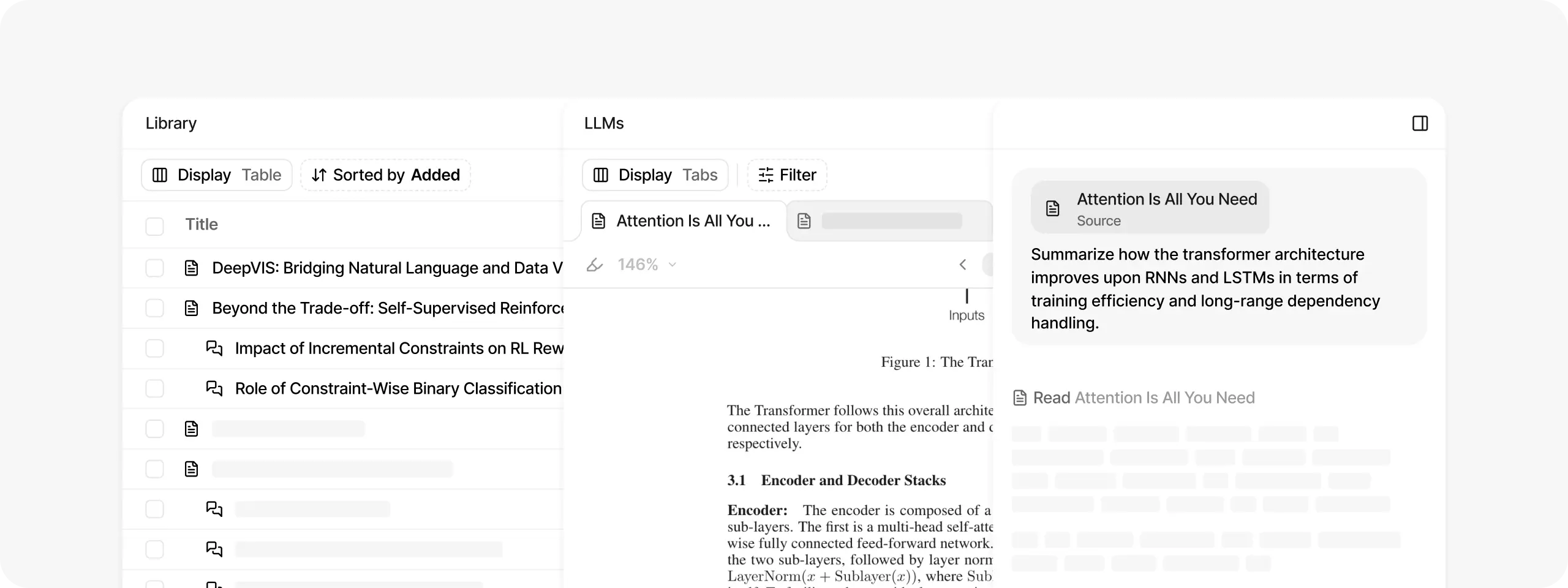Scite vs Elicit: The Specialist Showdown [2025]
"I tried several tools that sell themselves as paper analyzers, but neither did really well." This frustration echoes across research teams everywhere.
Researchers end up cobbling together multiple solutions: one tool for finding papers, another for citation analysis, a third for writing, and somehow coordinating with teammates through email or Slack. It works, but barely.
This fragmentation is where research insights get lost and collaboration breaks down. While tools like Scite and Elicit excel in their specialties, they actually contribute to this problem by solving only one piece of the research puzzle.
But what if there was a different approach? Read on to find out!
What is the main difference between Scite AI and Elicit?
The main difference between Scite and Elicit is that Elicit extracts and summarizes information from research papers to help answer questions and automate literature reviews, while Scite analyzes how papers are cited to assess their credibility and impact.
Elicit works by using semantic search and language models to scan the Semantic Scholar database, pulling data from full texts when available or from abstracts if not.
Scite, on the other hand, works by indexing citation statements from major publishers and classifying them as supporting, contrasting, or mentioning, helping users evaluate the reliability of a paper based on how it's cited by others.
Both AI research tools streamline the process of finding relevant studies, reducing manual effort.
What if you need more than specialized tools like Scite or Elicit?
The Scite vs Elicit debate misses a crucial point: both tools excel individually but contribute to workflow fragmentation. For research teams tired of switching between discovery tools (Elicit), citation analyzers (Scite), writing apps, and research collaboration platforms, Anara agent system offers unified research automation.
While Scite analyzes citation contexts and Elicit extracts data from academic databases, Anara's specialized agents handle comprehensive research workflows:
- @SearchPapers to access academic databases, offering similar functionality to Elicit
- @Research to synthesize insights across database searches AND your curated library
- @CompleteForm to automate systematic reviews
- @CreateCitation handles reference generation, all with source highlighting that provides verification beyond what either specialized tool offers.
The key difference: Scite and Elicit excel at single functions within fragmented workflows. Anara 2.0's agent ecosystem automates complete research processes from discovering literature to synthesizing multi-source insights to extracting systematic data.

Experience research agents that eliminate workflow fragmentation
Get Anara's agents freeTo understand how Scite vs Elicit vs Anara differ in comprehensive research capability, here's a head-to-head feature comparison.
How does each tool find what you need?
When it comes to discovering research, Elicit vs Scite vs Anara take a different approach:
Scite provides advanced search with filtering across 200M+ papers. If you know what you're looking for in published literature, their filtering capabilities are unmatched. You can drill down by publication date, journal, author, or citation type.
Elicit shines with semantic search across 125M+ papers, surfacing relevant studies even when you don't have perfect keywords. Ask "What are the effects of meditation on anxiety?" and it finds relevant papers regardless of exact terminology.
Anara offers both approaches through specialized agents: accesses academic databases (PubMed, arXiv, JSTOR) for external discovery like Elicit, and/or find information across your curated library of PDFs, videos, audio, and web content. Synthesize insights across both your personal collection AND database searches simultaneously.
Winner depends on your workflow: External discovery (Scite or Elicit) vs. unifying external discovery and personal library analysis with complete control over curated sources (Anara).
Stop juggling research tools. Deploy Anara's agents for complete literature review automation
Sign up for AnaraWhich platform understands the research context base?
This is where the platforms diverge most dramatically:
Scite's breakthrough feature is Smart Citations that categorize each reference as supporting, contrasting, or merely mentioning the original work. This gives you nuanced context about how findings are actually being received in the literature. The feature is invaluable for understanding research credibility.
Elicit focuses on summarizing and extracting key data from papers but doesn't classify citation context. It's excellent at pulling out methods, outcomes, and participants but unlike Scite, Elicit won't tell you if later studies contradicted the findings. Additionally, the quality of insights can vary significantly depending on whether full-text access is available or just abstracts.
Anara takes a different approach with source verification through chunk highlighting. Instead of analyzing citation relationships, it shows you exactly which part of your documents informed each AI response, reducing hallucinations and maintaining research rigor.
Clear winner: Scite dominates citation analysis, while Anara excels at source transparency.
Anara's source highlighting shows me the precise section where data comes from, so I can understand the context and share accurate information with my team.
A chemistry PhD turned clean tech CTO
How smart are Elicit vs Scite AI research assistants?
All three platforms use AI, but their approaches reveal different philosophies:
Scite provides evidence-based responses drawn from their massive academic database. Ask about a research topic and get answers backed by published literature.
Elicit automates literature review with AI tasks like summarization, extraction, and synthesis. It's particularly strong at systematic reviews, with highest accuracy for data extraction in empirical domains.
Anara uses multiple premium AI models (GPT-4, Claude 3.5) that work across all content types in your library. Whether you're analyzing a research paper, interview transcript, or conference video, you get the same AI-powered insights with direct source linking.
Winner varies by need: Systematic reviews (Elicit), published literature analysis (Scite), multimedia research (Anara).
Get video and audio support that other platforms don't provide
Try Anara todayWhich platform fits your research workflow better?
How you organize and track research reveals Scite vs Elicit target user:
Scite offers custom dashboards for tracking up to 25,000 DOIs, real-time citation alerts, and visual citation maps. It's built for researchers who need to monitor how their work is being cited and track research developments in their field.
Elicit provides organized tables, custom columns, and notebook features for managing findings. You can create structured data extractions and organize papers around specific research questions.
Anara integrates workflow automation through specialized agents, allowing you to discover literature, collect your research papers, analyze them, and write in one platform without switching tools.
Workflow integration winner: Anara provides the most research automation—from discovery through publication—while Scite and Elicit require multiple tools to complete research workflows.
Discover literature, extract data, and synthesize insights without switching tools
Switch to Anara for freeCan your team actually collaborate on research?
This is where the fundamental difference between Scite and Elicit vs Anara becomes crystal clear:
Scite enables sharing of dashboards and search analyses but remains primarily individual-focused. Enterprise features support organization-wide analytics, but real-time collaboration isn't the core experience. Teams often end up emailing screenshots or links rather than working together seamlessly.
Elicit is designed almost entirely for individual workflows. While you can export notebooks or share custom columns, there's no real-time collaboration or team workspace functionality. Research teams typically need to coordinate their Elicit work through external tools like Slack or email.
Anara is built from the ground up for research teams. Real-time collaborative workspaces, simultaneous editing, shared libraries, comments, @mentions, and team admin controls create a true collaborative research environment.
Collaboration winner: Anara completely wins over Scite and Elicit. It's the only platform designed for teams.
How well do they integrate with your existing tools?
How these platforms fit into existing research workflows varies significantly:
Scite integrates with research libraries and reference managers, positioning itself as a powerful addition to existing workflows rather than a replacement.
Elicit allows PDF uploads and supports exports to Zotero, maintaining compatibility with traditional academic workflows while adding AI-powered analysis.
Anara aims to replace reference managers entirely, offering Chrome extensions, DOI imports, and integration with Zotero. It's betting that researchers want a unified platform rather than fragmented tools.
Integration philosophy: Complement existing tools (Scite or Elicit) vs. replace them (Anara).
What makes each platform truly unique?
Each platform has developed specialized features that reflect their core strengths:
Scite offers reference checks for retracted or disputed works and comprehensive impact metrics—essential for researchers who need to verify the credibility of their sources.
Elicit provides specialized data extractors for tables and figures, topic finders, and brainstorming assistants optimized for systematic reviews and empirical research.
Anara pioneered the research agent ecosystem that spans multimedia analysis, team collaboration, and complete workflow automation from discovery through citation generation.
Specialization winner: Each platform excels in its domain. Scite for citation analysis, Elicit for structured extraction, Anara for comprehensive research workflow automation that eliminates tool fragmentation.
FAQ
What is better for citation analysis: Scite or Elicit?
Scite is considered better for citation analysis. While Elicit can extract citation data from papers, it lacks Scite's specialized citation context analysis, including:
- Smart Citations (supporting, contrasting, or mentioning)
- Citation credibility scores
- Deep citation context for each source
What is better for paper discovery: Elicit vs Scite?
When comparing Scite vs Elicit, the latter leads in paper discovery, exploratory research and systematic literature discovery. Elicit's semantic search across 125M+ papers allows researchers to find relevant studies using natural language queries, even with imperfect keywords. While Scite offers advanced filtering across 200M+ papers, it’s more helpful with targeted searches when you know specific parameters.
Can researchers use Scite or Elicit for collaborative research?
While Scite allows dashboard sharing and Elicit permits notebook exports, both platforms are designed for individual researchers. If you’re working in a lab, agency, or industry team, Anara is the only option purpose-built for collaboration offering team management features that neither Scite or Elicit have.
Do Scite or Elicit handle multimedia content?
No, Scite and Elicit are limited to academic papers and text-based documents. However, Anara uses the same AI-powered analysis across diverse content types:
- PDFs
- Videos (e.g. interviews, webinars)
- Audio files (e.g. focus groups)
- Web content
- Images and visual data
